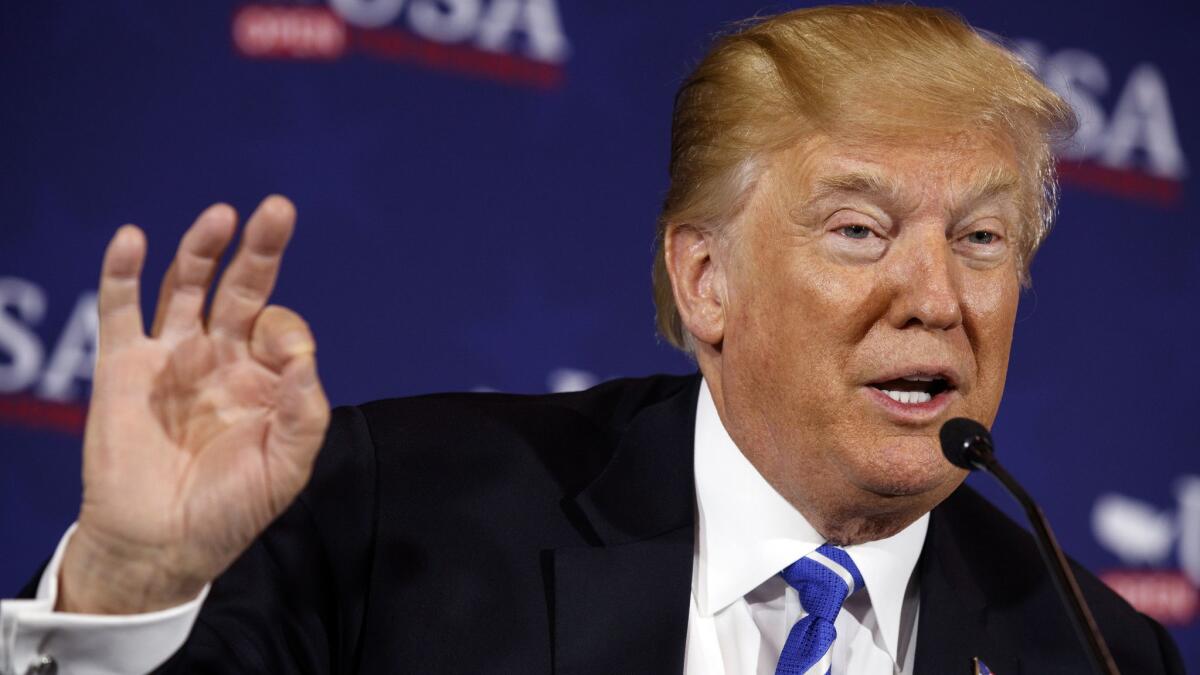Column: Deconstructing Trump’s whopper about California voter fraud

Reporting from Sacramento — The easy analysis of President Trump’s relentless attacks on California’s 2016 election results is this: Maybe he simply hasn’t gotten over the thumping he took in the Golden State.
But there’s more than just Trump’s feelings at stake when he keeps claiming there’s rampant voter fraud here. There’s real civic danger when the president peddles that whopper.
“If it begins to undermine confidence in our democracy, people will begin to wonder whether or not to vote,” said Secretary of State Alex Padilla.
Stashing cash for a rainy day isn’t as easy as it sounds for California government »
At a West Virginia event on tax reform last week, Trump began drifting into a riff about Democrats rigging elections.
“In many places, like California, the same person votes many times. You probably heard about that,” he told the crowd. “They always like to say, ‘Oh, that’s a conspiracy theory.’ Not a conspiracy theory, folks. Millions and millions of people.”
Well, it would indeed take a conspiracy — and one of historic proportions — to pull off what he pretends is a provable fact.
Like other states, California doesn’t hold a single election. Here, that means 58 separate county elections run by local officials who are responsible for voter registration and tallying the ballots cast in all races. Counties in California’s biggest jurisdictions are overseen by a blend of Republican and Democratic supervisors.
Some local registrars are elected, others are appointed. In either case, the scheme that they would need their help (or ignorance) for “millions and millions of people” to vote fraudulently would be epic in size or stealth. And then ask yourself: Why would this dastardly cabal run up the score — Trump lost in California by more than 4.2 million votes — and therefore draw all that attention?
Then there are the mechanics of how we vote. California elections are built around paper ballots, after the state’s former top elections official cut off the use of most touchscreen devices more than a decade ago. And 58% of all ballots two years ago were cast absentee. The idea of stuffing the polling place ballot box is nothing short of antiquated.
What we do know is that confirmed cases of voter fraud in California are extremely rare. There were 149 cases investigated by state officials in 2016, more than most years over the past decade. Investigators only found six cases out of 23.1 million votes cast worth sending to local district attorneys.
Sign up for our Essential Politics newsletter »
Trump said last week that voter fraud is hard to prove in California “because the state guards their records. They don’t want [anyone] to see it,” the president said.
Twice last summer, Padilla refused to give a copy of the state’s voter database to the now-defunct Trump voter fraud commission. The information is hardly a secret — candidates, political strategists, journalists and others under specific guidelines can purchase the data. Padilla argued the commission wouldn’t clarify who they’d share the information with. Even then, it’s only a list of registration and not of who voted.
One longtime supporter of the president, state Sen. Joel Anderson (R-Alpine), thinks there should be an “independent audit.” Depending on how such an audit would be set up, there might be solid support to conduct one.
Until then, what Trump keeps repeating has to be categorized as a myth. It’s important to remember that no one can say voter fraud is non-existent in California; there’s data that proves otherwise. What’s being said is that the confirmed number of cases are exceedingly rare. Anyone, including the president of the United States, who has solid and substantial proof to the contrary should step forward.
Follow @johnmyers on Twitter, sign up for our daily Essential Politics newsletter and listen to the weekly California Politics Podcast
ALSO:
Updates on California politics
More to Read
Get the L.A. Times Politics newsletter
Deeply reported insights into legislation, politics and policy from Sacramento, Washington and beyond. In your inbox three times per week.
You may occasionally receive promotional content from the Los Angeles Times.











